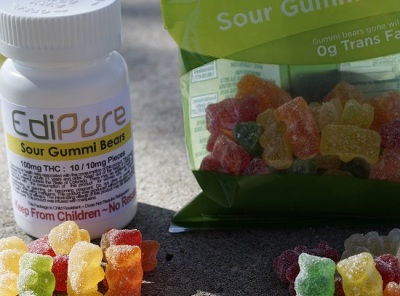Denver warned of pot-laced Halloween candy, pot industry resists restriction on edibles

DENVER (Christian Examiner) – A trend in children overdoses as well as two deaths linked to marijuana edibles has alarmed Denver parents about the perils of pot-laced candies as Halloween approaches.
Denver police have even produced a video, urging Denver residents to be wary of familiar-looking candies because of the ease with which they can be turned into pot edibles--by simply spraying treats like Sour Patch Kids, Gummi Bears and gum drops with hash oil.
Unfortunately, children cannot tell the difference.
"My daughter is 7 years old," Denver Police spokesman Ron Hackett told ABC News. "She could care less if it's [candy] growing mold. She's going to eat it."
Yet, marijuana industry representatives have pushed back against proposals that pot-infused foods and drinks should have a distinct look out of the package.
According to the Denver police video, edibles may account for as much as 20 to 30 percent of sales in pot shops and that fact is not lost on pot pushers.
Pot-laced edibles are produced to look and sound like familiar foods—"Reefer's" imitate Reese's peanut butter cups, "Keef Kat" candy hints at Kit Kat bars, "3 Raskateers" are fake 3 Musketeers. Even Skippy Peanut Butter and Froot Loops have pot-laced competitors.
Aimed at increasing market size, these are meant to entice consumers who might be hesitant to smoke pot.
Unfortunately, ready availability of marijuana edibles and knock-off marketing methods has proven to be a deadly combination for children and adult users.
Children's Hospital Colorado has published data on its website pointing to a surge in marijuana overdosing among children since 2005.
According to the hospital, "states that allow some form of legal marijuana have seen a 30 percent increase in calls to poison control centers for marijuana ingestions, relative to a 1 percent increase in non-legal states."
Likewise, news reports offer other grim instances in Denver that portray the deadly effects of edible marijuana products.
Earlier this year a man killed his wife after ingesting marijuana-laced candy, and a college student jumped to his death after eating pot-infused cookies.
So far, 23 states have legalized medicinal marijuana, but only Colorado and Washington have approved recreational marijuana for adults.
Yet, despite mounting evidence pointing to legitimate safety concerns about pot in all forms, states continue to move toward legalization of marijuana.
World Health Organization expert, Wayne Hall recently published his meta-analysis of 20 years of research and concluded pot use is harmful to your health. Among his findings:
-- cannabis use increases the risk of accidents and can produce dependence (10 percent of all pot smokers and 1 in 6 of teen users develop dependence syndrome)
-- teen pot smokers were more likely to use other illicit drugs and were at twice the risk of dropping out of school
-- the risk of a car crash doubled under the influence of pot, and cannabis users had overall higher rates of hospitalization for injury from all causes than former pot users or non-users
He also found marijuana use doubled the risk of suicide among regular users; tripled and even quadrupled the risk for myocardial infarction among middle-aged and older adults; and was related to a two- to three-fold increase in testicular cancers for men.
In November, voters in Alaska, Florida, Oregon and the District of Columbia will consider measures to open their states to marijuana sales.
Florida ballots will include a constitutional amendment to legalize medical marijuana, while citizens Alaska, Oregon and D.C. will decide whether possession of small amounts should be legal.